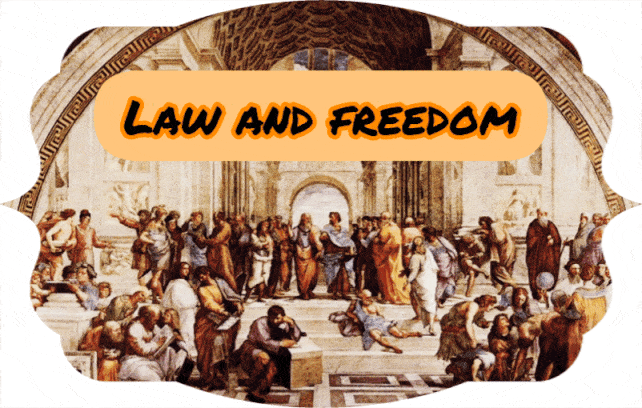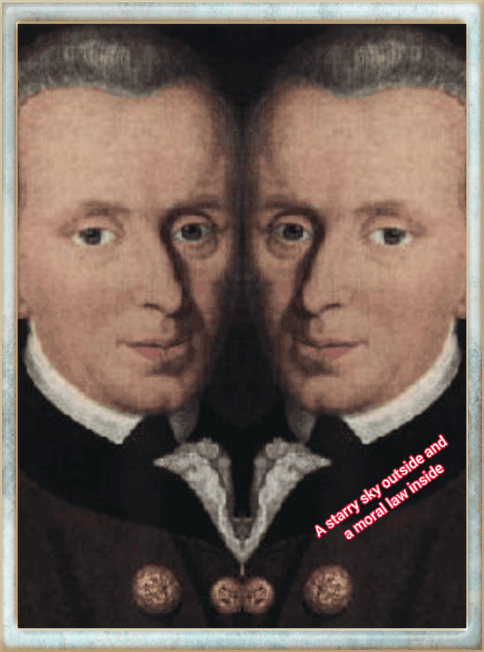[Esp-eng] Entre ley y libertad || Between law and freedom

Source
Saludos amigos, como cada lunes vengo a compartirles un pensamiento filosófico y su relación con nuestra existencia cotidiana. Esta idea nació de una iniciativa filosófica propuesta por @reymoya95 y @filoriologo, a la cual yo también me he sumado hace aproximadamente un mes.
En esta ocasión, parto de un frase que tiene mucho para comentarle, incluso hasta abrir indefinidos debates, pero como mi propósito no es más que abrir la vida a la filosofía y la filosofía a la vida, por ahora es suficiente con indicar sólo algunos puntos de reflexión personal.
Es la siguiente: “Dos cosas me llenan de admiración: el cielo estrellado sobre mí y la ley moral dentro de mí”, pertenece a Immanuel Kant y tenía tal impacto en él que quiso se grabara en la lápida de su tumba.
Greetings friends, as every Monday I come to share with you a philosophical thought and its relation to our daily existence. This idea was born from a philosophical initiative proposed by @reymoya95 and @filoriologo, which I also joined about a month ago.
On this occasion, I start from a sentence that has a lot to say, even to the point of opening indefinite debates, but as my purpose is nothing more than opening life to philosophy and philosophy to life, for now it is enough to indicate only some points of personal reflection.
It is the following: "Two things fill me with admiration: the starry sky above me and the moral law within me ", belongs to Immanuel Kant and had such an impact on him that he wanted it engraved on his tombstone.

Significado
Meaning


Source
El propósito de la filosofía en Kant es examinar todo desde el punto de vista de la razón sola, incluso también el comportamiento moral, es decir, ¿qué debemos hacer? Lo cual él desarrollo en su obra “Crítica de la Razón práctica”.
Allí él plantea, a grandes rasgos, una moral deontológica, es decir, una que mueva al ser humano a actuar por el deber mismo, más allá de cualquier condicionamiento externo, pues, aunque existe una realidad fuera de nosotros (lo que él significa con la frase “el cielo estrellado fuera de mí”), al final, quien regula la forma de comportarse en y frente a esta realidad es el mismo ser humano (de allí, el final de la frase: “la ley moral dentro de mí”).
Con esto, Kant lo que busca es resaltar la autonomía de la libertad humana, que va más allá de lo que está bien o está mal, pues, ¿de qué vale realizar “x” o “y” acción si no lo hacemos de manera libre?
The purpose of philosophy in Kant is to examine everything from the point of view of reason alone, even moral behavior, that is, what should we do? Which he developed in his work "Critique of Practical Reason".
There he proposes, in broad terms, a deontological morality, that is, one that moves the human being to act by the very duty, beyond any external conditioning, because, although there is a reality outside of us (which he means with the phrase "the starry sky outside of me"), in the end, the one who regulates the way of behaving in and in front of this reality is the human being himself (hence, the end of the phrase: "the moral law inside of me").
With this, Kant seeks to highlight the autonomy of human freedom, which goes beyond what is right or wrong, for what is the point of performing "x" or "y" action if we do not do it freely?

Análisis
Analysis


Sin tocar en las posibles consecuencias de la afirmación de Kant si se toma de manera unilateral y literal, quiero detenerme en el valor que tiene la frase en sí misma, resaltando no sólo la autonomía de la libertad (“la ley moral dentro de mí”) sino también la existencia de algo más allá de ella (“el cielo estrellado fuera de mí”). Por eso, la considero válida hoy para replantear una moral objetiva.
Así es, me gusta pensar en esta frase como punto de partida de cuál parámetros seguir en nuestra conducta moral, ya que se respeta tanto un orden objetivo: podemos pensar en las normas, deberes y leyes, cosas que existen sobre nosotros y que están presentes, de una u otra manera, en toda sociedad.
Pero, esto solo no hace la moral humana, ya que es necesario interiorizar dicho orden “legal” para que al acatarlo no sea asumido como algo meramente impuesto desde afuera, sino desde la fuerza interior de la libertad. Por eso, el título de este post es “entre ley y liberad”, ya que no es tan fácil determinar la moralidad (bondad y maldad) de un acto humano, es necesario tener en cuenta tanto un orden objetivo pero también la subjetividad de la persona (hasta donde llega el conocimiento de la norma, su intención, el grado de libertad, circunstancias, etc.)
Without touching on the possible consequences of Kant's statement if taken unilaterally and literally, I want to dwell on the value of the phrase itself, highlighting not only the autonomy of freedom ("the moral law within me") but also the existence of something beyond it ("the starry sky outside me"). Therefore, I consider it valid today to rethink an objective morality.
That's right, I like to think of this sentence as a starting point of what parameters to follow in our moral conduct, since an objective order is so much respected: we can think of the norms, duties and laws, things that exist about us and that are present, in one way or another, in every society.
But, this alone does not make human morality, since it is necessary to interiorize such a "legal" order so that by obeying it it is not assumed as something merely imposed from outside, but from the inner strength of freedom. Therefore, the title of this post is "between law and freedom", since it is not so easy to determine the morality (goodness or evil) of a human act, it is necessary to take into account both an objective order but also the subjectivity of the person (as far as the knowledge of the norm, its intention, the degree of freedom, circumstances, etc.)

Aplicación
Application


- Conocimiento y respeto de las normas morales. Para poder guardar un orden dentro las diversas comunidades son necesarias, aunque no nos gusten, establecer algunas normas. Muchas de las cuáles existen antes de nosotros (No matar, por ejemplo), ¿quiénes somos nosotros para quebrantarlas?
Es necesario conocer las culturas de las diversas sociedades, sus códigos éticos, donde vamos a descubrir la razón de ser de muchos de sus comportamientos. Pero no sólo eso sino respetar lo que la razón humana ha logrado descubrir como dañino o conveniente a la naturaleza humana.
- Hacer el bien en libertad. Actualmente se enarbola mucho la bandera de la liberad pero realmente cuando seguimos una norma o hacemos algo ¿lo hacemos convencidos de la bondad de lo que hacemos o simplemente empujados por motivos externos?
Esto, para mí, es fundamental, ya que no es sólo hacer el bien sino hacerlo con convicción, desde el corazón, asumiendo la bondad de la acción realizada, pues, puedo hacer algo bueno pero si lo hago porque me han obligado no soy totalmente libre y le resto mérito a lo realizado.
- No condenar a nadie definitivamente. Además de la ley moral, existe la ley legal civil que cuando es quebrantada, se castiga al agresor, aquí no me estoy refiriendo a este tipo de condenas, que son justas precisamente para la protección de la humanidad. Me refiero al juicio que condena definitivamente el destino de las personas, etiquetándolas como buenas y malas.
Pienso debemos evitar esto, ya que al final, no sabemos los motivos profundos y últimos que mueven a que la persona actué de una o determinada manera. Por eso, hasta el mismo papa Juan Pablo II defendía el respeto a lo sagrado de la conciencia humana, a la cual tiene acceso únicamente Dios y el mismo ser humano. Por cierto, esta conciencia humana la podemos comparar a lo que Kant llama esa ley moral dentro de mí.
- Knowledge and respect for moral standards. In order to keep an order within the various communities it is necessary, even if we don't like it, to establish some rules. Many of which exist before us (Do not kill, for example), who are we to break them?
It is therefore necessary to know the cultures of the various societies, their ethical codes, where we will discover the reason for many of their behaviors. But not only has that, but to respect what human reason managed to discover as harmful or convenient to human nature.
- To do good in freedom. Nowadays the flag of freedom is raised a lot but really when we follow a rule or do something, do we do it convinced of the goodness of what we do or simply pushed by external reasons?
This, for me, is fundamental, since it is not only to do good but to do it with conviction, from the heart, assuming the goodness of the action performed, because, I can do something good but if I do it because I have been forced I am not totally free and I give credit to what has been done.
- Do not condemn anyone definitively. In addition to the moral law, there is the civil legal law that when it is broken, the aggressor is punished. Here I am not referring to this type of condemnation, which is just for the protection of humanity. I am referring to the judgment that definitively condemns the destiny of people, labeling them as good and bad.
I think we should avoid this, since in the end, we do not know the deep and ultimate motives that lead a person to act in a certain way. For this reason, even Pope John Paul II defended respect for the sacredness of the human conscience, to which only God and human beings have access. Indeed, we can compare this human conscience to what Kant calls that moral law within me.

Muchas gracias por haberme acompañado en la lectura de este post, espero tus comentarios y que nos podamos volver a encontrar en una próxima publicación, hasta luego.
Thank you very much for having accompanied me in the reading of this post, wishing you always the best and that we can meet again in a next publication, I say goodbye, see you later.


- Traducido con www.DeepL.com/Translator || Translated with www.DeepL.com/Translator
- Los emojis se hacen con Bitmoji.com || The emojis are made with Bitmoji.com
Este Post será compartido en Twitter con hastags #hive y #posh para promover la iniciativa "Prueba de Compartir" de Hive y @ocd || This post will be shared in Twitter with hastags #hive and #posh to promote Hive and @ocd "Proof of Share" initiative.


https://twitter.com/JBitcoins/status/1310637313022742529
Una lectura muy sabrosa e importante, no es un actuar conforme a cómo vamos, sino más bien de acuerdo a lo que creemos,las convicciones. Saludos.
Me contenta te haya gustado la lectura y, sobre todo, captado su esencia.
Posted using Dapplr
Excelente post!! Disfrute mucho la lectura. Me encanta que te hayas sumado a la iniciativa. Saludos
Saludos, gracias, a mí me encanta que ustedes la hayan propuesto.
Posted using Dapplr
Genial. Gracias por compartir esta reflexión. Kant es muy esperanzador en esta bruma postveritativa. No niego el encanto que tiene el análisis y la deconstrucción de los discursos y de los dogmas, de hecho son necesarios, pero siento que usted apunta a algo más importante y que creo que sí hemos perdido bastante, que tiene quizás que ver con el reconocimiento de la dignidad humana, y de las implicaciones éticas de todo lo que hacemos, que tiene que ver con lo que pensamos, entendiendo al humano como capaz de razonar y de actuar bien. Como comentario aparte, a mí me gusta mucho Rousseau. Seguiré leyéndolo a usted por acá.
Hola, amigo, gracias por la lectura y el feedback. Sí, has captado mi intención, de hecho al partir de pensamientos de filósofos procuro transcender sin traicionar el significado que pudo tener en ese momento histórico, para actualizarlo a nuestros días.
Posted using Dapplr
¡Genial, loable empeño!
Excelente post... Tienes razón en cuanto a la apertura de una disertación profunda, puesto que Kant al abordar la razo pura abre aristas discursivas interesantes... Un abrazo
Saludos, gracias por detenerse y valorar este escrito. Así es, Kant deja abierta varias puertas, las cuáles incluso lleva a caminos diversos.
Posted using Dapplr